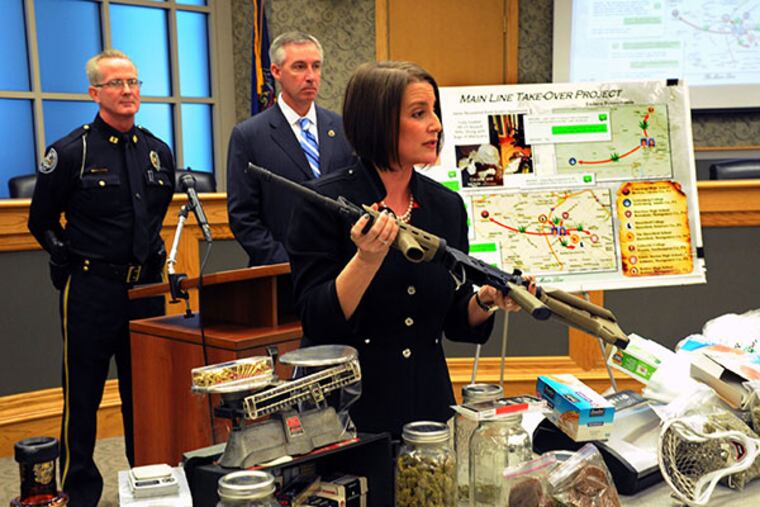School officials not alerted to Main Line drug probe
The investigation into a Main Line high school drug ring began months ago. Police arrested one alleged ringleader in February.

The investigation into a Main Line high school drug ring began months ago. Police arrested one alleged ringleader in February.
But school administrators said this week that they didn't know about the probe until hours before authorities Monday announced the arrests of 11 people and unveiled a cache of seized drugs, cash, and weapons.
The admission underscores what has become a frustration among some law enforcement agencies vying to root out networks that peddle to teens: Collaborating with schools during investigations can be difficult - or even counterproductive.
"School systems, historically, just are not interested in working with law enforcement," said Jonathan Duecker, special agent in charge of the Bureau of Narcotics Investigation and Drug Control at the Pennsylvania Attorney General's Office.
Chester County District Attorney Thomas Hogan said the issue is an image problem. "No school wants to be known as the school where we found drugs," said Hogan, whose office had a small role in the Main Line case. "They don't even want to hear that there are drugs in their schools."
Montgomery County District Attorney Risa Vetri Ferman said Monday that Neil K. Scott, 25, of Haverford, and Timothy C. Brooks, 18, of Villanova, organized and operated the drug trafficking operation they nicknamed "the main line take over project." The men, both alumni of the Haverford School, a private prep school, recruited student dealers and sold marijuana and other drugs at Lower Merion, Harriton, Conestoga, and Radnor High Schools, plus several colleges.
Detectives arrested Scott in February on the day they searched his Haverford apartment. Loaded weapons and five pounds of marijuana, about one ounce of cocaine, and other drugs they found was enough for authorities to arrest him, Montgomery County First Assistant District Attorney Kevin R. Steele said.
Evidence led investigators to his alleged accomplices, including two juveniles still in high school, police said. The others, including Brooks, were arrested this week.
The Montgomery County District Attorney's Office did work with some of the colleges involved in the case, including Gettysburg, Haverford, and Lafayette, Steele said. But he said the high schools did not need to know about the investigation.
"We're not going to bring them into aspects of the investigation unless it's us showing up at their schools and showing a search warrant," he said.
Said Lower Merion Police Superintendent Michael McGrath: "You would undercut your investigation if you let too many people in on the details prior to making an arrest."
In other cases, however, investigators say, they butted heads with school administrators who seemed more concerned about the perception of drugs being found in their buildings.
Hogan said that twice in the last four years, authorities performed a drug sweep in a large Chester County public school - he wouldn't say which one - and found no drugs. He said he believes word of the looming sweeps got out after police contacted district officials to coordinate with them.
"Somewhere along the line," he said, "someone said something to somebody else. Next thing you know, every kid in that school knows they won't have drugs in that school for two weeks."
In another example, Hogan said he was aware of a private school that seized and disposed of drugs without contacting police. "We had to explain to them that's not how it works," he said.
Delaware County District Attorney Jack Whelan, whose office also had a role in the Main Line case, said school superintendents are becoming more open to working with police. He pointed to a presentation he gave to county school leaders about a year ago.
"There were certain superintendents who said they didn't believe that, in their particular school district, heroin had reached epidemic proportions," Whelan said. They became convinced, he said, when shown statistics about drug overdoses.
School and police officials say that cooperation does occur - though some districts might prefer to deal, at least initially, with problems themselves.
After Monday's arrests were announced, Radnor school officials posted an online reminder that "one of the most important factors in keeping kids safe is information provided to school administrators by students and parents."
The message made no mention of alerting police of a possible crime. A school spokesman said the message did not mean to discourage anyone from contacting authorities.
Duecker said he has been making attempts to develop customized drug education programs for area schools, seeking input from students and administrators on how to tailor the programs.
The reception has been mixed, he said. And he said he was worried about school districts that are unwilling to participate in even educational programming - because the drug landscape is changing quickly in the suburbs.
"The trafficking networks are organic now," he said. "They're here, in place, using people from the Main Line. ... It should alarm schools and it should alarm parents."
Students seemed nonplussed by news of the arrests.
Most of about a dozen students from Radnor and Lower Merion High Schools who were interviewed Tuesday said they were not surprised to learn of the alleged drug ring operating in their schools.
"I know there are a lot of kids who do drugs," said Maura Hess, a 15-year-old sophomore at Lower Merion.
Hess and Mira Franzlo, a 16-year-old sophomore, said teachers in their school probably know about drug use among students but try to ignore it.
At Radnor, 15-year-old Nico Reh said he knew "a lot of people" involved with drugs.
"Some people do stupid things," Reh said.
610-313-8109
@carolyntweets